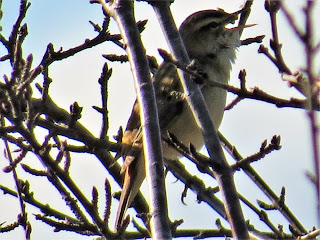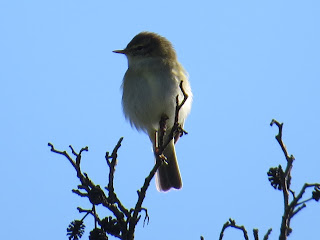April in the UK is often a strange month. Sometimes it is warm, but most often it is wet and full of April showers. But sometimes, the weather can change back to how it was a few months ago in winter. So to wake up and heading into the city to catch my train to Brundall with frost first thing in the morning today was nothing unusual. What was unusual, however, was seeing a man run past you on city street at 6:30am on this chilly morning wearing nothing but a pair of boxers, a green clowns wig with a flower pot and some sort of balloon flower thing on top of it and a pair of joke glasses. He was either preparing for the London marathon or totally insane or perhaps even both. Whichever it was, it was quite a bizarre start to my day.
 |
| Cetti's Warbler |
When I eventually arrived at Strumpshaw, the warm spring-like weather that we've been experiencing in the past few weeks had returned. I had a quick peek outside the blind beside Reception Hide and saw a kingfisher before it took off at the sight of me. I then made a brief stop at Fen Hide, seeing marsh harriers and Cobber the black swan. Then I heard a cuckoo calling somewhere in the direction of the river again, so I went to check it out. Just like last week, I was unable to locate one. When I got to the river trail, it had stopped calling. At least the Cetti's warblers and other warbler species were showing well, but not all of them would sit still long enough for me to take a photo. I also heard three separate bursts from a booming bittern.
 |
| Willow Warbler |
 |
| Sedge Warbler |
 |
| Cobber the Black Swan |
 |
| Great Crested Grebe |
 |
| Seven-spot Ladybird |
While making my way back for my shift, I found another of my targets, a seven-spot ladybird. This small red, spotty beetle is on my list mainly because it is one of the UK's most popular insects. It is also an insect that has a big part in Norfolk's culture. Long ago, the Norfolk dialect was once almost like a foreign language and had many strange and often funny-sounding words that were used to call a variety of things. One of the strangest of all and the most well known of these was bishy-barney-bee, which is used to call a ladybird (or ladybug if you're American). Sadly, most of these funny Norfolk words are now mostly forgotten and rarely used. The reason is probably because people are now fully educated in English using proper words and not these Norfolk words and so they started to die out. But bishy-barney-bee and a few other words are still sometimes used now and then.
 |
| Mallard with ducklings |
Back at Reception Hide, spring has fully established itself after that wintery start as there were two female mallards parading ducklings around the broad. They both have roughly 6-7 of these small fluffy babies. How many will survive is anyone's guess. As well as ducklings, there were also butterflies and swallows on the wing, a pair of Egyptian geese making a lot of noise, a lizard sunning itself on a stump in front of the hide, a green woodpecker making a brief bouncy flight over the broad and, perhaps the strangest sight since the near-naked fool running past me earlier, a Chinese water deer swimming while followed by a gaggle of greylags! I swear, this day was weird but wonderful.
 |
| Duckling |

 |
| Chinese Water Deer |
 |
| Chinese Water Deer swimming! |
 |
| Blue Tit |
 |
| Green-veined White |
 |
| Orange-tip |
 |
| Holly Blue |
 |
| Common Lizard |
 |
| Egyptian Goose |
 |
| Black-headed Gull |
 |
| Marsh Harrier |
 |
| Pied Wagtail |
 |
| Hoverfly |
 |
| Common Carder Bee |























































No comments:
Post a Comment